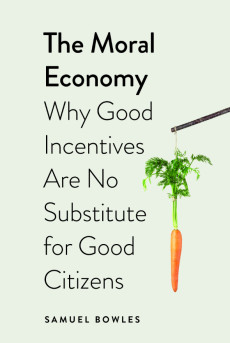
The Moral Economy: Why Good Incentives Are No Substitute for Good Citizens
Samuel Bowles
266 pages, Yale University Press, 2016
Neoclassical economics assumes that we are all clearheaded and logical, able to make farsighted, rational calculations that maximize our utility. But behavioral economists have built a strong case that humans are actually pretty bad at making decisions: We are biased toward the status quo and consistently inconsistent in our choices about future outcomes. In his terrific new book, The Moral Economy, Samuel Bowles, who leads the Behavioral Sciences Program at the Santa Fe Institute, takes these observations one step further. He suggests not only that it is important to understand how both incentives and morals affect human behavior, but also that we must consider them together, because the use of incentives can and often does influence moral choices.
As indicated by the subtitle, “Why Good Incentives Are No Substitute for Good Citizens,” Bowles’s book urges us to question the utility of employing financial rewards and punishments instead of appealing to our basic human goodness. He attacks the core of Jean-Jacques Rousseau’s “Social Contract,” an injunction to treat “men as they are” that takes for granted that we are self-interested and amoral. This assumption underlies much of our public policy, legal systems, and organizational design today, and as a result, Bowles says, “material incentives are now deployed to motivate student learning, teacher effectiveness, weight loss, voting, quitting smoking, the switch from plastic grocery bags to reusable ones, fiduciary responsibility in financial management, and basic research.” However, when we pay people to do something they know they should be doing anyway as good citizens, he argues, they devalue the moral basis for behaving that way. And that’s a shame—intrinsic motivation can be strong and in many cases may be a better motivation than extrinsic rewards.
Through a combination of logical argument, storytelling, and substantial case and field research, Bowles makes a compelling case that not only are financial incentives often misguided—they can even make the situation worse. A simple, well-known example he uses comes from Haifa, Israel. In 1998, six day care centers there imposed a fine on parents who were late in picking up their children. Parents responded by showing up late twice as often. Even when the centers revoked the fine after 12 weeks, the parents’ tardiness persisted! Instead of appealing to their sense of common good, the fee caused parents to assume that paying it made up for their lateness.
Cleary, as Bowles says, if the fine had been large enough, the parents might have behaved more pro-socially. But perhaps a different policy wouldn’t have crowded out ethical and social motivations. Bowles contrasts the day care example nicely with a small tax on plastic grocery bags implemented in Ireland alongside a strong public education campaign with the message, “Don’t trash the Emerald Isle.” The appeal to the common good combined with the fee reduced plastic bag consumption by 94 percent in just two weeks!
Bowles’ challenge to the assumption that markets are “morality-free zones” calls into question some of the most basic choices of governance. When everything has a price and all contracts include every conceivable cost and contingency, competitive markets maximize utility and require no assumptions about morality. But what if you can’t monetize some things? Even worse, what if putting a price on everything causes us to discount intrinsic morality, the “work ethic of the employee, the creativity of the software engineer, or the honesty of the borrower or asset manager”? Blind trust in human goodness is probably not wise, but appealing to our better angels may be. Take that, market advocates.
More philosophical and conceptual than practical, The Moral Economy asks questions more than it suggests applications. It is provocative but can leave a reader asking, “What now?” I would have loved to listen to Bowles’ lectures on which his book was based—I really wanted to hear the Q&A about what it all means for real-life decision-making.
Nonetheless, the book caused me to step back and think fresh about a range of policy questions. Specific markets, for example: According to the ideas in Bowles’ book, we should price carbon, but probably not blood or sex, and definitely not human organs. And citizenship: Is it an obligation, a right, or something we have to pay people to do? Organizational design: You probably still should use commissions as some of the basis for compensation, but don’t ignore values, culture, and storytelling as means to drive employees’ performance. (From my experience, our best public and social sector organizations, from the US Coast Guard to the Cleveland Clinic and Kahn Academy, already understand this.) Bowles’ book even caused me to think about parenting: Allowances are helpful in teaching children about trade-offs, but paying for grades devalues the importance of learning.
According to an old saying, “Laws control the lesser man. Right conduct controls the greater.” Perhaps, as Bowles suggests, this statement isn’t a libertarian clarion call but rather an observation that we might have a better society if we realized that humans are not total rationalists like Star Trek’s Spock. And indeed, why can’t we make our human interactions more, well, human?

